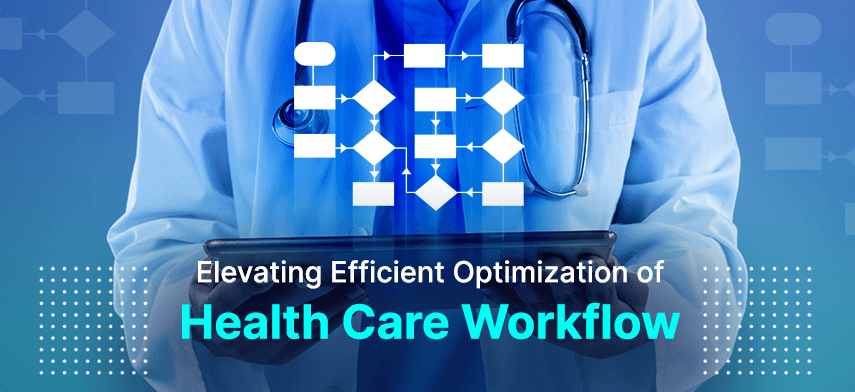Clinical workflow analysis is one of the key factors in healthcare management systems, providing exemplary services to maximum patients. The challenging times ushered in by the COVID-19 pandemic have been exceptionally well received by the hospital workflow processes. The streamlining of operational procedures has eliminated any management-related concerns, errors by staff members, and preventing any restrictions in operations.
Presently, workflow optimization tools are vital in the medical field, it is addressing all the necessary consequences amidst this pandemic. Therefore, clinical workflow optimization can assist in upgrading healthcare facilities to an optimum level.
Let us have a better understanding of how clinical workflow optimization helps.
What is Clinical Workflow Optimization?
Clinical/healthcare workflow optimization refers to the process of improving an existing healthcare workflow. It includes:
- Improving staff productivity.
- Reducing operational costs.
- Adding new functions to the workflow to increase efficiency and profitability.
Healthcare delivery optimization, a keen hospital workflow process, ensures the best possible care delivery to patients. Therefore, enhancing health outcomes through workflow optimization techniques.
Fine-tuning clinical workflows help in nitpicking the inefficiencies that can be a probable cause for hampering patient flow. Meanwhile, the increase in efficiency equals clinicians receiving more time with their patients and provide suitable health solutions.
The most effective and popular approach to enhance workflow management is Lean Methodology. It focuses on using workflow optimization tools to automate administrative, operational tasks. This allows the staff to stay productive, reduce unnecessary costs, provide a better patient experience, and increase profitability.
Electronic health records (EHRs) and hospital management systems have become standardized in the healthcare sector. However, implementing EHR and other digital systems can be an expensive proposition. Healthcare businesses need to optimize their workflows to derive the desired value from their technological investment.
Common Workflow Problems Faced by Healthcare Providers
Deviations from policies
Healthcare facilities need to comply with various rules, regulations, and policies, which can be challenging.
Making preventable errors
Errors in maintaining patient records and history can adversely affect the treatment experience.
Repetitive tasks
The hospital staff spends way too much time on repetitive tasks like appointment scheduling, patient records management, etc.
Ineffective utilization of resources
Relying on manual procedures to efficiently manage the limited hospital resources can raise considerable problems.
Increased patient wait time
Unoptimized workflows can slow down operations and increase patient wait times, affecting patient experience in the process.
Departmental barriers
Disorganized boarding of patients can lead to overcrowding and affect the emergency department barriers.
Streamlining Hospital Operations Using Clinical Workflow Optimization
Clinical workflow analysis is well orchestrated and can be repeatable to aim for delivering better care with the help of digital technology. Implementing technology solutions isn’t enough. Hence, healthcare facility managers need to deploy workflow optimization techniques to improve the hospital workflow process.
For seamless streamlining, healthcare facilities admit patients fasters, coordinate and communicate with clinicians, and cooperate with the medical centers. Thus, keeping medical records and documentations optimized and up-to-date with modern workflow optimization software. Hence, clinical workflow optimization improves healthcare operations on a day-to-day basis.
Benefits of Clinical Workflow Optimization in Healthcare Management Systems
1 Amplifies ROI
Patients and medical professionals are not satisfied when ROI decreases, making medical facilities lose access to growth. Health management systems identify operational inefficiencies and disorganization. With workflow optimization techniques the amount of ROI aimed at a specific investment can clarify the expectations of a facility, enhancing better health optimization.
2 Enhances provider and patient expectations
Workflow optimization allows you to become more effective as a hospital. Using hospital management systems enables you to have complete and accurate patient information that you can use to offer superior quality treatment and increase patient satisfaction.
3 Maintains personnel value
Retirement or resignation of doctors can adversely affect the quality of care a patient receives. Workflow optimization tools address this issue and reduce the dependency on redundant workflow systems while maintaining personnel value.
4 Ensures clarity
Communication is still a major concern between medical departments and staff members. Optimizing workflows showcases consistency in the operational system. It provides employers and employees with better directions while enhancing communication lines, and HR processes. Hence, the entire procedure can be more transparent and ensures clarity.
5 Comply with Policies, Laws, and Regulations
Healthcare facilities need to abide by numerous laws, regulations, and policies related to patient treatment, data collection, management, and more. Clinical workflow analysis can help to become more compliant and avoid any legal challenges.
6 Accelerates growth of software development in healthcare
Workflow optimization software can enhance the growth of software development in healthcare facilities. It can ensure medical facilities keep patient data and records up-to-date while maintaining treatment workflow and providing the best care delivery services.
Significant Workflow Optimization for Healthcare Providers
Clinical workflow optimization is crucial because as it reduces resource wastage and helps healthcare providers streamline daily operations by:
Attaining business insights
Getting a clear, top-level view of operations is important for any business. Workflow optimization establishes a set of processes, which provide detailed insights into business procedures.
Identifying redundancies
Healthcare business includes a lot of redundant and administrative tasks. Workflow optimization helps in identifying which processes are truly necessary and which ones can be delegated or automated.
Reducing micromanagement
Employees don’t appreciate being micromanaged, and micromanagement can cause a lot of problems in a healthcare business environment.
All in all, many healthcare facilities understand the importance of workflow, but they take a backseat when it comes to analyzing and improving them. The right workflow management tools assist in overcoming common hospital management system challenges setting businesses apart from one another.
Digital Healthcare Scanning Solutions Optimizing Healthcare Workflows
Implementing the right hospital management systems is the key to seamless clinical workflow optimization. These solutions are ideal for all types of healthcare facilities, including hospitals, outpatient centers, laboratories, community care facilities, and more.
Digital healthcare scanning solutions can help you with the following processes:
- Patient tracking
- Medication authentication and control
- Wait-time monitoring
- Asset management
- Inventory management
- Access control
- Facilities management
Mobisoft Infotech offers advanced digital scanning solutions for healthcare businesses that allow you to ensure patient safety and enhance value-based care.

Wrapping Up
In this era of interconnected health, hospitals and healthcare facility managers need to adopt technology to streamline and automate their processes. Deploying healthcare scanning solutions into your healthcare workflow can go a long way in reducing costs, enhancing productivity, improving service quality, and boosting revenue and profitability.





 June 4, 2021
June 4, 2021


